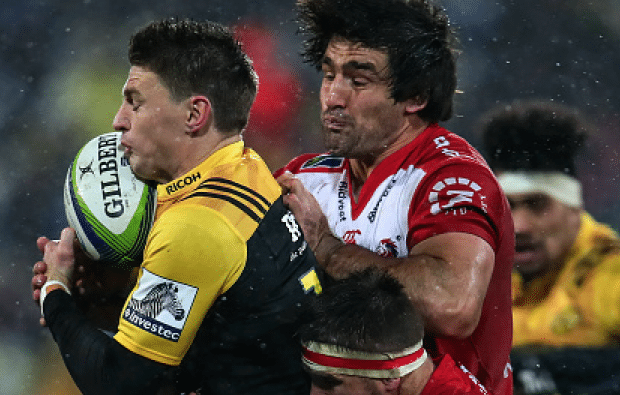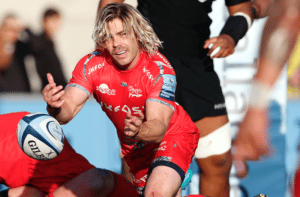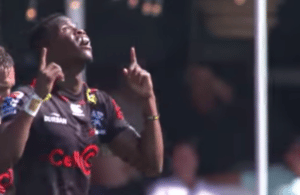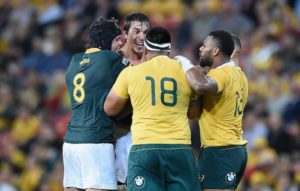The Lions have every reason to believe that they can out-muscle and out-last the Hurricanes in the semi-final in Johannesburg on Saturday, writes JON CARDINELLI.
When have the Hurricanes been at their worst this season? When have their ball-carriers been limited? When has Beauden Barrett failed to find the time and the space to unleash his strike runners, or to find teammates out wide with a characteristic kick-pass?
The Lions’ coaches and players should be asking themselves these questions in the lead-up to the semi-final showdown at Ellis Park. The Hurricanes have been at their worst when they’ve come up against the tournament’s stronger defensive teams.
The Chiefs conceded 18 and 14 points respectively in their two conference-stage wins against the Hurricanes. The Crusaders conceded 12 points, and no tries, in their victory over the 2016 champions.
The Chiefs and Crusaders won the battles at the collisions and breakdowns and thus limited the impact of halfbacks TJ Perenara and Barrett. They proved that it’s possible to beat the Hurricanes at their own game.
Meanwhile, the Lions have not played a New Zealand side in 2017. They have been dominant across a regular-season campaign that’s included emphatic wins against Australian, South African and Japanese opposition.
However, it’s universally accepted that teams should be judged by their performances against Kiwi opposition. New Zealand teams have won 14 of the 21 Super Rugby titles since the tournament’s inception.
So what chance do the Lions have against the Hurricanes this Saturday? A reading of the stats that matter make for an interesting answer.
I spoke to a top coach recently about the defensive records of the eight qualifying teams. When I reminded him that the Lions have conceded the fewest tries (29), he was dismissive. Others I’ve spoken to feel the same way, as if that conference record counts for little. After all, the Lions achieved those defensive numbers while playing against weaker teams.
My argument is that the Lions have made a significant tactical shift in 2017. That may not have been evident last week, when an all-out attacking approach and some woeful goal-kicking so nearly cost them the quarter-final against the Sharks. For the most part, however, the Lions have placed an emphasis on the set pieces and have taken pride in their defence. The results have been plain to see.
In 2016, the Lions matched the New Zealand sides for intensity and managed to win four of those eight clashes. While they are yet to play a Kiwi team in 2017, the stats show why they are one of the fittest sides in the competition and why they will go the distance against the Hurricanes this Saturday.
The Hurricanes have scored more tries than any other side in 2017 (93). More specifically, they’ve scored the most tries in the fourth quarter of a game (29). On many occasions, they’ve moved up a gear during this period of the game to turn a comfortable win into an emphatic one.
The only side that comes close to matching the Hurricanes in this department is the Lions, who have scored 27 tries in the fourth quarter this season. The next best teams in this respect are the Highlanders and Stormers, with 18 tries apiece.
The Lions lead the way in terms of fewest tries conceded during the business end of a match, though. Their line has been breached on just five occasions this season. This highlights their fitness, as well as their determination in the final 20 minutes of a match.
It shouldn’t surprise to see that the other three semi-finalists ranked second to fourth in this category. The Crusaders have conceded six tries in the fourth quarter, the Hurricanes seven, and the Chiefs nine.
All that said, the Lions should be desperate for a good start this Saturday. They have to get on top of the Hurricanes at the set pieces and they have to win the gainline battle. That will ensure that they nullify, or at least contain, the threat of Perenara and Barrett.
The Lions and Hurricanes are at opposite ends of the tactical-kicking spectrum. The Lions rank 16th for kicks from hand this season, while the Hurricanes rank fourth.
One would expect the Lions to use the tactical boot more liberally in a semi-final situation. They will need to win territory before using their set pieces and ball carriers to exert pressure on the Hurricanes defence.
There’s been a lot of talk about the goal-kicking of Elton Jantjies, following his four misses in the quarter-final against the Sharks. Another wayward performance by Jantjies in the semi-final will cost the Lions the match and ultimately a crack at the title.
The Lions aren’t going to score four or five tries against a well-drilled defensive side like the Hurricanes. They will need to take their early scoring chances and make the most of their opportunities in front of goal.
A best-case scenario for the Lions will see the Hurricanes chasing the game in the fourth quarter. A worst-case scenario will see the Lions playing catch-up during this period. A more expansive approach by the Lions during the fourth quarter will only play into the Hurricanes’ hands.
The Lions will face their greatest test to date when they host the Hurricanes on Saturday. The game should reveal how far they have come as a defensive and tactical unit over the past 12 months.
The Hurricanes are already a complete side, but as witnessed in clashes against the Crusaders and Chiefs earlier this season, they are not unbeatable. Travel fatigue may limit the Hurricanes’ potency on this occasion, and there may come a time where they fail to match the Lions’ intensity in highveld conditions.
Stats and facts
o This will be the first meeting between these teams since the Hurricanes won the 2016 title after beating the Lions 20-3 in last year’s final; overall, the Hurricanes have won all but one of their previous 11 games against the Lions.
o The Lions will be looking to become only the second South African team in Super Rugby history to appear in back-to-back finals after the Bulls did so in 2009 and 2010.
o This will be the Hurricanes’ first playoff game in South Africa, where they’ve won four of their last five games (including two wins against the Lions).
o The Hurricanes (39) and Lions (38) average the most points scored per game of any teams in the competition so far this season, while each has also conceded a league-low 18 points per game.
o After returning for the Hurricanes last week for the first time since round four, Dane Coles is set to line up for his 100th Super Rugby game.
o Franco Mostert has stolen 14 lineouts so far this season, six more than any other player and 11 more than the Hurricanes’ best, Vaea Fifita and Brad Shields (three each).
Lions – 15 Andries Coetzee, 14 Ruan Combrinck, 13 Lionel Mapoe, 12 Harold Vorster, 11 Courtnall Skosan, 10 Elton Jantjies, 9 Ross Cronjé, 8 Ruan Ackermann, 7 Kwagga Smith, 6 Jaco Kriel (c), 5 Franco Mostert, 4 Andries Ferreira, 3 Ruan Dreyer, 2 Malcolm Marx, 1 Jacques van Rooyen.
Subs: 16 Akker van der Merwe, 17 Corné Fourie, 18 Johannes Jonker, 19 Lourens Erasmus, 20 Cyle Brink, 21 Faf de Klerk, 22 Rohan Janse van Rensburg, 23 Sylvian Mahuza.
Hurricanes – 15 Jordie Barrett, 14 Nehe Milner-Skudder, 13 Vince Aso, 12 Ngani Laumape, 11 Wes Goosen, 10 Beauden Barrett, 9 TJ Perenara (c), 8 Brad Shields, 7 Ardie Savea, 6 Vaea Fifita, 5 Sam Lousi, 4 Mark Abbott, 3 Jeff To’omaga-Allen, 2 Dane Coles, 1 Ben May.
Subs: 16 Ricky Riccitelli, 17 Chris Eves, 18 Loni Uhila, 19 Reed Prinsep, 20 Callum Gibbins, 21 Te Toiroa Tahuriorangi, 22 Otere Black, 23 Julian Savea.
Photo: Simon Watts/Getty Images





